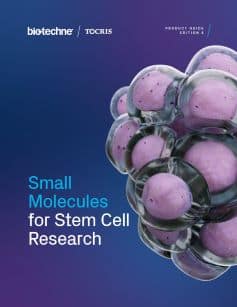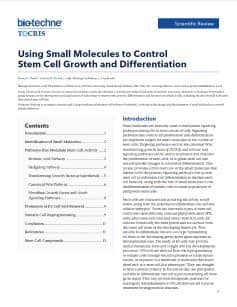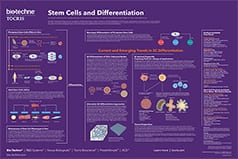GMP Small Molecules
GMP (or cGMP; Current Good Manufacturing Practice) is a set of harmonized guidelines to ensure safe, reliable, consistent and quality-assured products. Our GMP Small Molecules are suitable for use as ancillary reagents (raw materials) for the further manufacture of stem cell therapies.
Find out more about Bio-Techne's GMP Capabilities and how we can support your Cell and Gene Therapy development program.
| Cat. No. | 产品名称/活性 |
|---|---|
| TB4423-GMP | CHIR 99021 |
| CHIR 99021 synthesized to cGMP guidelines | |
| TB6053-GMP | LDN 193189 |
| LDN 193189 synthesized to cGMP guidelines | |
| TB1614-GMP | SB 431542 |
| SB 431542 synthesized to cGMP guidelines | |
| TB3748-GMP | XAV 939 |
| XAV 939 synthesized to cGMP guidelines | |
| TB1254-GMP | Y-27632 dihydrochloride |
| Y-27632 synthesized to cGMP guidelines |
Stem Cells and Therapy
Stem cells are defined by their ability to differentiate into specialized cells and to self-renew. The aim of stem cell therapy is to replace unhealthy or lost cells with new cells, with applications in a range of disorders including neurodegenerative diseases. Stem cells can be directed to differentiate into specific cell types for use as cell therapies. Typically, reprogramming of somatic cells and differentiation of PSCs into terminal lineages has been achieved through exogenous gene expression, via retroviral transfer. However, small molecules present several advantages over gene expression methods. They are easy to use and convenient, and can greatly reduce the time associated with stem cell differentiation, reprogramming and proliferation. The effects of small molecules are reversible and concentration dependent, enabling temporal control and meaning they can be used in different protocols with different outcomes. For examples of how small molecules can be used in place of or in combination with growth factors and other proteins in cell culture, please see our stem cell protocol snapshots.
Transition from Preclinical Research to Cell Therapy
An important consideration when developing a cell therapy is when to transition raw materials from research use only (RUO) to GMP. Although the quality and safety of raw materials is less important during the preclinical stages of development, the cost and freedom of change increases and decreases respectively, as the phase of development advances. We would recommend identifying a reliable supplier of your required GMP raw materials early in preclinical development, and transitioning from RUO to GMP as early as possible. This will avoid the need to conduct time-consuming and expensive comparative studies during the later stages of development. Our GMP small molecules are suitable for use in the manufacture of cell therapies. By introducing a GMP product line, Tocris is fulfilling its commitment to provide the life science community with the latest and most relevant reagents available, to make new discoveries possible.
Tell us about your GMP requirements by completing our GMP Compound Register Interest form.
Benefits of Tocris GMP Small Molecules
GMP Quality and Safety
The quality and safety of stem cell therapies and other ATMPs (Advanced Therapy Medicinal Products) depend on the quality and safety of raw materials / ancillary reagents. It is best practice for these raw materials to adhere to GMP specifications when being used in the development of stem cell therapies and other ATMPs. The Tocris range of GMP small molecules is manufactured following relevant sections of ICH Q7 guidelines (Good Manufacturing Practice Guide for Active Pharmaceutical Ingredients).
Our GMP small molecules are classified tier 2 risk as per USP <1043>: Ancillary Materials for Cell, Gene, and Tissue-Engineered Products. Ancillary material (AM) Risk Tier 2 is defined as "Low-risk, well characterized materials with intended use as AMs, produced in compliance with cGMPs".
Our highly skilled team have full control over the GMP process, meaning we can ensure:
- Batch-to-batch consistency
- Traceability from starting material to final product
- Animal-free production
- Fully qualified vendors of raw materials for our production processes
- Endotoxin and bioburden tested compounds
- Stringent QC testing
Security of GMP Supply
It is vital to have a consistent and reliable supply of GMP raw materials when developing ATMPs such as stem cell therapies. Any delay or quality issue can result in significant issues, including increased cost and risk to patient samples. At Tocris we are well known for our consistent and reliable resupply and can offer you:
- Consistent and assured supply of GMP materials
- Supply agreements and batch reservations
- A point of contact at all times throughout your development process
- Ability to scale up
Contact us today to discuss a supply agreement, reserve your batch, and let us know your scale of manufacturing requirements.
Stringent QA and QC
To ensure the highest quality our GMP compounds are synthesized under a quality assured manufacturing system and subjected to stringent quality control.
Analytical Tests:
- Purity - HPLC
- Product identification - NMR and Mass Spectrometry
- Water content - Karl Fischer
- Residue on Ignition
- Residual solvents
- Solubility
Microbiological Tests:
- Bioburden
- Endotoxin
Product Specific Documentation:
- Certificate of Analysis (CofA)
- Safety Data Sheet (SDS)
- TSE/BSE statement (Transmissible Spongiform Encephalopathy / Bovine Spongiform Encephalopathy)
- Product Specifications
These documents are available on request.
Regulatory Support
We offer the following regulatory support on request for our GMP product line:
- Auditing of our small molecule manufacturing facility in Bristol, UK
- Change notifications
Our GMP small molecules should only be used as raw materials / ancillary reagents for further ATMP manufacture, such as stem cell therapies. They are not intended for human or veterinary use.
Related Product From Bio-Techne
Literature for GMP Small Molecules
Tocris offers the following scientific literature for GMP Small Molecules to showcase our products. We invite you to request* your copy today!
*Please note that Tocris will only send literature to established scientific business / institute addresses.
Stem Cells Scientific Review
Written by Kirsty E. Clarke, Victoria B. Christie, Andy Whiting and Stefan A. Przyborski, this review provides an overview of the use of small molecules in the control of stem cell growth and differentiation. Key signaling pathways are highlighted, and the regulation of ES cell self-renewal and somatic cell reprogramming is discussed. Compounds available from Tocris are listed.
Stem Cell Workflow Poster
Stem cells have potential as a source of cells and tissues for research and treatment of disease. This poster summarizes some key protocols demonstrating the use of small molecules across the stem cell workflow, from reprogramming, through self-renewal, storage and differentiation to verification. Advantages of using small molecules are also highlighted.



